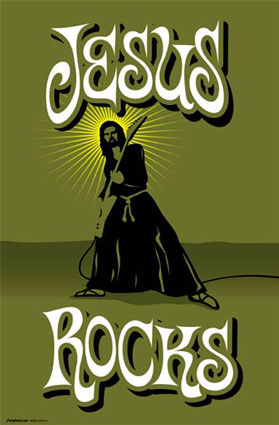In my previous post I challenged the idea of “church” and suggested that we put more emphasis on training and preparing for ministry and less emphasis trying to increase church attendance. After some dialogue, on this site and my Xanga (www.xanga.com/armytalk), I fleshed out the idea that there is a difference between personal transformation and religious practice. Those who are saturated with the church culture may have difficulty separating these two. Personal transformation that leads to community transformation is what we’re after. In order for this to happen we have to connect with the culture God is calling us to reach.
My church is in the process of developing two new ministries. One of those is a teen ministry that will (at least I think this is where God’s going) connect with the “rap” culture. The mission of the ministry will probably read something like this: “The mission of (whatever we call it) is to glorify God by engaging and challenging the youth culture to bring spiritual revival, social reform, and racial reconciliation through alternative forms of art.” (If you have any suggestions on this mission statement please let me know, I would love to hear them. Also, any ideas on a name for this ministry?) Spiritual revival, social reform, and racial reconciliation will be the focus of this ministry.
The avenue in which we would pursue these goals would be through “alternative forms of art.” My vision is to create a venue in which teens & young adults can express themselves through rap/music, dance, even poetry if it comes up. This ministry would be modeled after “The Loaf” which is a ministry of the Salvation Army in Lawrenceville, Georgia.
The Loaf
The Loaf, rather than connecting with the rap culture, connects with the “hardcore” culture. They have shows (or gigs/concerts) once a month on Friday night that attracts more than 300 kids. At their last event they had around 450. The Friday night events evolved into “Loaf Worship” which takes place on Sunday night and connects with the same culture. Loaf Worship, which just began three or four weeks ago, is having an attendance of somewhere between 40 and 50. Most of those are the result of the Friday night gigs.
The Loaf Format
The Friday night gigs usually consist of around six local bands. They will sometimes bring in a “headliner” to generate interest. (At the first event Mortal Treason was the headliner.) Each band, with the exception of the headliner, will normally play a 15 to 20 minute set. Doors open around 6:30 p.m., the show begins at 7:00 p.m. and goes ‘till around 11:00 p.m. to mid-night. It’s $5.00 at the door with free snacks. It’s awesome. Here are some photos off their web-site to help you get an idea of the atmosphere.
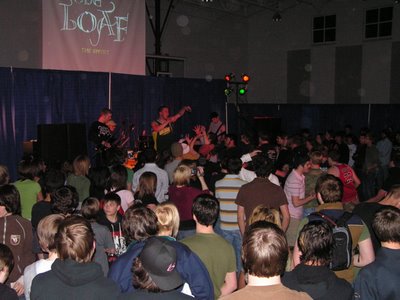
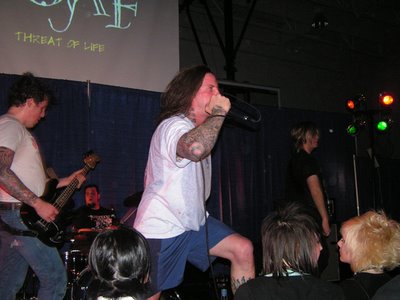
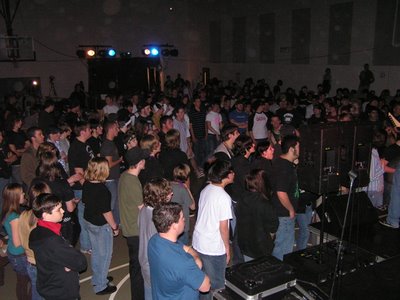
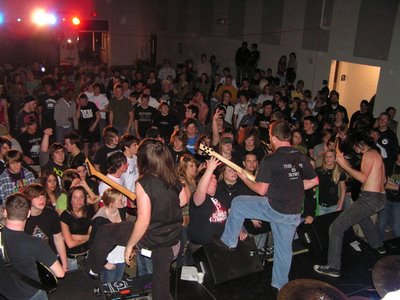
Our rap ministry could look something like this. Have you seen Eminem’s movie “8 Mile?” If you have, then you know what kind of venue I’m thinking about. The difference between “8 mile” and ours is that ours will be positive and missional.
Here’s the question in regards to church: Where does this thing (The Loaf or our new ministry) go? You obviously could add (as they’re doing) a culturally relevant worship and discipleship component. But then what? I mean, think about it . . . What’s the chance of any of these kids finding home in any of our churches? What if they are called to ministry? Does our denomination/organization have a place for them? I guess we do. . .as long as they change and become like us . . . as long as they’re willing to leave their culture and learn a new language.
What happens when a culture or generation arises that does not value our religious traditions and practices? What happens when the people whom we are called to reach does not respect or appreciate our form and expression of worship? What do we do? How do we respond?
Feel free to comment. I’m interested in your response.
Check out The Loaf’s web site for more info at: http://www.attheloaf.com/
(PS If I respond to your comment I will respond on this post.: )




